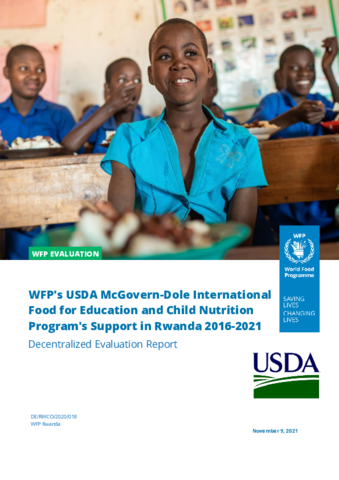
This decentralized evaluation was commissioned by WFP Rwanda Country Office and covers United States Department of Agriculture (USDA) McGovern-Dole International Food for Education and Child Nutrition (“McGovern-Dole”) Programme’s Support in Rwanda (2016-2021). It was carried out in 2021. The evaluation was commissioned to examine the project’s impact and identifies lessons for future programming and was intended for both accountability and learning purposes. It focused on assessing the relevance, effectiveness, efficiency, impact and sustainability.
Overarching evaluation questions focused on: (i) Have literacy rates of school-age children improved over the duration of the programme? (ii) Has the use of health and dietary practices increased? (iii) What is the level of community involvement and participation in decision-making in school governance mechanisms? and (iv) What are the key institutions and governance structures required to effectively deliver, implement, and sustain school meal interventions?
The evaluation covered school feeding.
Key evaluation findings included:
- The Programme is highly relevant to the needs and goals of schools in some of Rwanda’s poorest areas. It supports improved learning outcomes and infrastructure and complementary activities to achieve those outcomes. The programme aligns with government strategies and priorities in education, food and nutrition, and school health.
- Programme activities designed to improve the quality of literacy instruction were both well-suited to the objective and indeed contributed to the observed improvements in student reading skills.
- Health and hygiene infrastructure improved at schools, with improved water supply, latrines, girls’ sanitation rooms, and kitchen infrastructure in place at all schools.
- Parent engagement and understanding of the importance of education, along with parent trust in schools is increasing. School General Assembly Committees were strengthened through training on governance, school management, and conducting community dialogues.
- The sustainable impact of the McGovern-Dole Programme lies in its significant contributions to government policy and strategies for a national school feeding programme, and in the Government’s institutionalization of school feeding within government staffing structures.
Key recommendations from the evaluation included:
- Ensure appropriate balance between capacity strengthening and direct implementation. A key factor that has enabled the programme to contribute to the development of the national school feeding programme is its technical credibility and grounded experience.
- Maintain support to Phase I McGovern-Dole Programme schools, communities, and cooperatives. The Phase II design includes all Phase I schools until the second half of Phase II.
- Build adaptive management and agility into the Phase II design and implementation plan. A key strength in Phase I was making critical decisions efficiently and at the right time.
- Establish contingency planning at school and community level to prepare for and respond to shocks and stresses like COVID-19.
- Implement appropriate gender analysis and approaches for Phase II of the programme.



